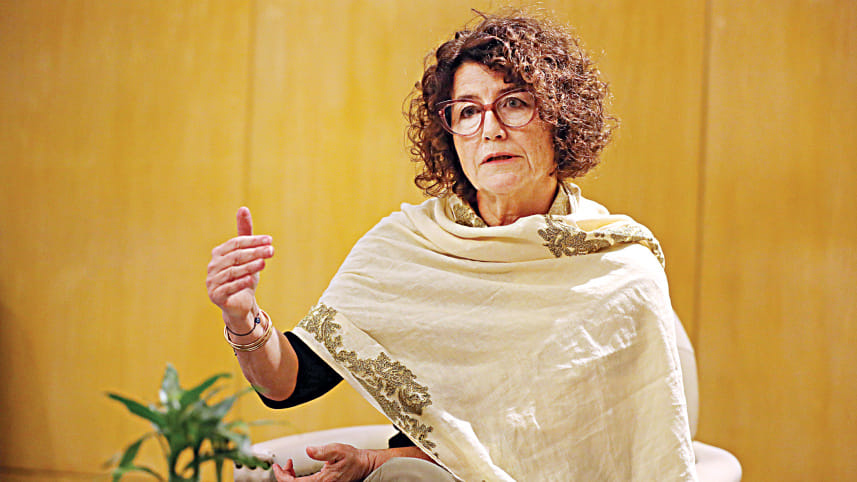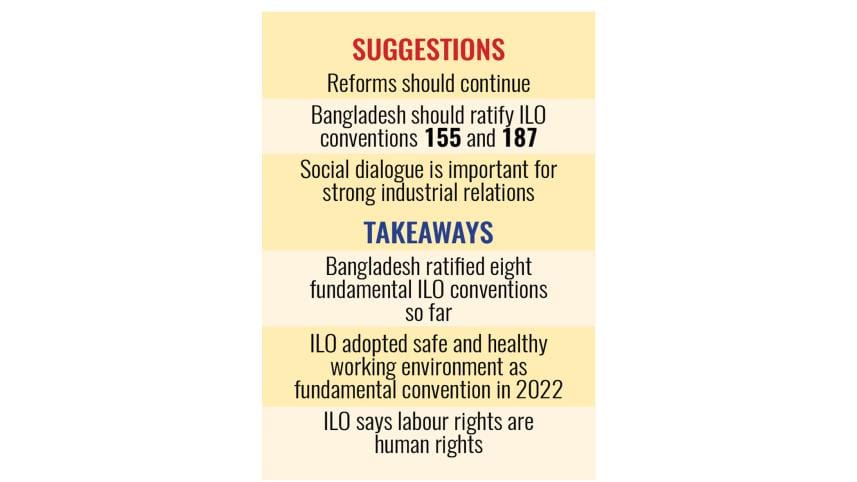Continue reforms to retain trade after LDC graduation

The reform initiatives taken by the interim government should be continued as these reforms may pave the way towards a more modern, equal and inclusive Bangladesh, said a top official of the International Labour Organization (ILO).
In an interview with The Daily Star in Dhaka, Manuela Tomei, assistant director-general for Governance, Rights and Dialogue at the ILO, said adapting to changes after Bangladesh's graduation from a least developed country (LDC) in 2026 would not be easy for the country as all preferential market treatments would no longer be available.
"That is why the current reforms are so important," she emphasised.
"It is very important that these reforms do not remain on paper but actually pave the way for a journey towards a much more modern, equal, inclusive and high-performing Bangladesh," Tomei said.

Tomei, who came to Dhaka recently to attend meetings on industrial relations, said the ILO will continue to provide the support it has been offering.
She said the support would not be to the government only, rather it would be rendered to social partners with regard to improving the quality of labour laws and the functioning of institutions that are essential to ensure full implementation of those laws.
Another very important part of pre-graduation, which will be absolutely instrumental in ensuring opportunities once Bangladesh graduates from LDC status, is ratifying 10 fundamental ILO conventions, she said.
So far, Bangladesh has ratified eight of them. According to Tomei, Bangladesh should also ratify all the conventions as decided by all states in the 2022 ILO Conference.
Regarding her visit to Dhaka, Tomei said that the interim government in November of this year made an appearance to the governing body of the ILO regarding measures they were about to take in response to a complaint filed against the government of Bangladesh.
The complaint is about Bangladesh's breaching three conventions that the government has ratified -- freedom of association convention, the convention on the right to collective bargaining and the convention on labour inspection to ensure proper respect of labour rights.
She said the ILO received a very encouraging message from the interim government with a clear commitment to act upon the requests made and chart a number of measures with specific timeframes.
"So, my visit here is to express of course the support of the ILO office to the commitments of the interim government as well as the commitment taken by our social partners and the workers and employers organisations to push forward these reforms to deliver on decent work and social justice."
According to her, the purpose of the visit was also to see to what extent, besides the much-needed labour law reforms, the ILO could support ongoing efforts and commitments taken by workers, their organisations and the government to move jointly towards a more effective and transparent social dialogue to maintain and sustain the outcomes of labour law reforms.
Tomei said labour law reforms and implementation are quite important for the post-graduation period because of increasing requirements and expectations in major markets for Bangladesh's exports.
Other countries require compliance with human rights, due diligence and 10 fundamental principles at work, including occupational safety and health, she commented. "This package of rights is regarded as enabling the country to improve the realisation of other labour rights because of freedom of association and collective bargaining."
If you are able to speak with one voice for a large number of businesses or workers, you can reduce transaction costs and negotiate for better wages, Tomei said.
"Change in the law does not guarantee that the law will be implemented or respected, and it is very important to have a tripartite joint commitment to engage in meaningful dialogue to achieve balanced outcomes."
"Because we have the interests of workers, the government and employers, we need to find a middle ground," she said.
"So, social dialogue is very important from that viewpoint," said the top ILO official, adding that another critical issue relates to supporting the efforts the interim government has committed to engaging in, which refers to managing grievances to precisely avoid potential major concerns escalating into strikes or riots.
She advocated for having a mechanism in place that is independent and transparent and allows for properly addressing disputes arising from work and employment relationships.
"So, let me start by saying that labour rights are human rights. Because all these, not only the fundamental principle rights at work, even the right to a living wage recognised by the covenants and social and economic rights, all these rights have been articulated also in the human rights declaration," she added.
"Labour rights and human rights are absolutely essential," she said. "Often, there is a perception that respecting these rights would translate into additional costs and therefore increase production costs for employers, resulting in lower competitiveness for enterprises respecting these rights."
But the evidence actually shows that respecting these fundamental principles, rights and conventions, including freedom of association and collective bargaining, does not compromise a country's competitive position, she commented.
"We have substantial empirical evidence demonstrating this."
Undoubtedly, to reduce labour costs, you need to improve productivity. Better working conditions are essential for enhancing productivity, but you also need other interventions such as skills enhancement to compete, Tomei said.
Bangladesh has already done some work in this respect immediately after the Rana Plaza garment factory collapse in 2013, and the current government is committed to delivering on this particular piece of a broader set of reforms, she added.
"I think there is no doubt about the political commitment and, as I said, the commitment from social partners, workers and employers are absolutely essential for this to work in practice."
Moving towards a new status will also translate into the elimination of several preferential treatments Bangladesh previously had access to as an LDC country.
However, the various reforms being envisioned -- not only in terms of labour law content but also in modernising and improving the industrial relations system, determining national wage policies including the minimum wage and identifying social protection -- are absolutely essential to act as a reference and facilitate the transition, she added.
"So, I am confident that Bangladesh will be able to be up to the task," she also said.
"As I said, there is growing pressure on investors and buyers to do business with countries that uphold certain rights. This is no longer an option."
"This is why investing in labour law improvement, transparency, and a well-functioning and fair industrial relations system is crucial to diversifying the economy.
"I mean Bangladesh definitely needs to diversify and cannot just rely essentially or mainly on the revenue coming from the ready-made garment industry," she added.




 For all latest news, follow The Daily Star's Google News channel.
For all latest news, follow The Daily Star's Google News channel.
Comments